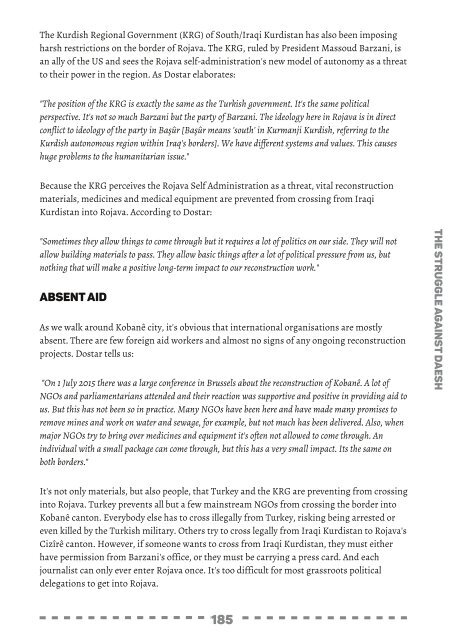STRUGGLES
Struggles-for-autonomy-in-Kurdistan
Struggles-for-autonomy-in-Kurdistan
Create successful ePaper yourself
Turn your PDF publications into a flip-book with our unique Google optimized e-Paper software.
The Kurdish Regional Government (KRG) ofSouth/Iraqi Kurdistan has also been imposing<br />
harsh restrictions on the border ofRojava. The KRG, ruled by President Massoud Barzani, is<br />
an ally ofthe US and sees the Rojava self-administration's new model ofautonomy as a threat<br />
to their power in the region. As Dostar elaborates:<br />
"The position ofthe KRG is exactly the same as the Turkish government. It's the same political<br />
perspective. It's not so much Barzani but the party ofBarzani. The ideology here in Rojava is in direct<br />
conflict to ideology ofthe party in Başûr [Başûr means 'south' in Kurmanji Kurdish, referring to the<br />
Kurdish autonomous region within Iraq's borders]. We have different systems and values. This causes<br />
huge problems to the humanitarian issue."<br />
Because the KRG perceives the Rojava SelfAdministration as a threat, vital reconstruction<br />
materials, medicines and medical equipment are prevented from crossing from Iraqi<br />
Kurdistan into Rojava. According to Dostar:<br />
"Sometimes they allow things to come through but it requires a lot ofpolitics on our side. They will not<br />
allow building materials to pass. They allow basic things after a lot ofpolitical pressure from us, but<br />
nothing that will make a positive long-term impact to our reconstruction work."<br />
Absentaid<br />
As we walk around Kobanê city, it's obvious that international organisations are mostly<br />
absent. There are few foreign aid workers and almost no signs ofany ongoing reconstruction<br />
projects. Dostar tells us:<br />
"On 1 July 2015 there was a large conference in Brussels about the reconstruction ofKobanê. A lot of<br />
NGOs and parliamentarians attended and their reaction was supportive and positive in providing aid to<br />
us. But this has not been so in practice. Many NGOs have been here and have made many promises to<br />
remove mines and work on water and sewage, for example, but not much has been delivered. Also, when<br />
major NGOs try to bring over medicines and equipment it's often not allowed to come through. An<br />
individual with a small package can come through, but this has a very small impact. Its the same on<br />
both borders."<br />
the struggle against daesh<br />
It's not only materials, but also people, that Turkey and the KRG are preventing from crossing<br />
into Rojava. Turkey prevents all but a few mainstream NGOs from crossing the border into<br />
Kobanê canton. Everybody else has to cross illegally from Turkey, risking being arrested or<br />
even killed by the Turkish military. Others try to cross legally from Iraqi Kurdistan to Rojava's<br />
Cizîrê canton. However, ifsomeone wants to cross from Iraqi Kurdistan, they must either<br />
have permission from Barzani's office, or they must be carrying a press card. And each<br />
journalist can only ever enter Rojava once. It's too difficult for most grassroots political<br />
delegations to get into Rojava.<br />
185


